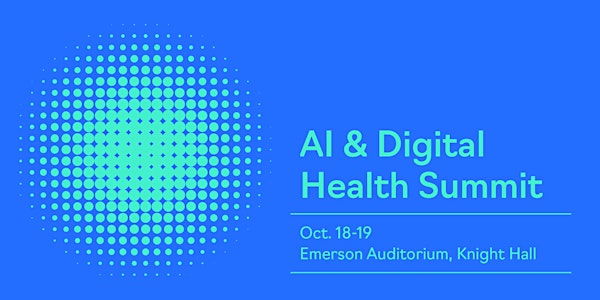
AI & Digital Health Summit (2 days)
Join us for two days of field-leading speakers, engaging panel discussions and connecting with the community working in this space at WashU.
Date and time
Location
Emerson Auditorium, Knight Hall
Throop Drive and Snow Way Dr St. Louis, MO 63105About this event
If you are unable to attend in person, you can view the live stream of our keynote on Oct. 18 and our distinguished speaker on Oct. 19 by selecting the 'virtual' ticket option.
KEYNOTE SPEAKER
Wednesday, October 18
Atul Butte, MD, PhD
Director, Bakar Computational Health Sciences Institute, UCSF
Chief Data Scientist, University of California Health System
DISTINGUISHED SPEAKER
Thursday, October 19
Maryellen Giger, PhD
A.N. Pritzker Distinguished Service Professor of Radiology, Committee on Medical Physics, & the College
The University of Chicago
Sponsored by the Department of Biomedical Engineering, McKelvey School of Engineering
Presented by:
Here & Next WashU Digital Transformation
AIH Institute, McKelvey School of Engineering
Institute for Informatics, Data Science and Biostatistics (I2DB) at WashU Medicine
BJC Healthcare Innovation Lab
Programming steering committee:
Philip R.O. Payne - Digital Transformation Implementation Chair
Ruopeng An, Brown School at Washington University - Track Lead for Intersection of AI and Human-Computer Interaction
Michal Grinstein Weiss, Brown School at Washington University - Track Lead for AI and the Law
Chenyang Lu, McKelvey School of Engineering - Track Lead for AI in Medicine
Jacob Montgomery, College of Arts and Sciences - Track Lead for Generative AI
Chandler Ahrens, Sam Fox School of Design & Visual Arts
Matthew Allen, Sam Fox School of Design & Visual Arts
Patrick Fowler, Brown School at Washington University
Jonathan Hanahan, Sam Fox School of Design & Visual Arts
Pauline Kim, Washington University School of Law
Sharvari Mhatre, Sam Fox School of Design & Visual Arts
Keith Schnakenberg, College of Arts and Sciences
Constance Vale, Sam Fox School of Design & Visual Arts
Yevgeniy Vorobeychik (Eugene), McKelvey School of Engineering
Dennis Zhang, Olin Business School
Learn more about Digital Transformation at WashU.
ABOUT OUR KEYNOTE SPEAKER
Atul Butte, MD, PhD, is the Priscilla Chan and Mark Zuckerberg Distinguished Professor and inaugural Director of the Bakar Computational Health Sciences Institute at the University of California, San Francisco (UCSF). Dr. Butte is also the Chief Data Scientist for the entire University of California Health System, the tenth largest by revenue in the United States. Dr. Butte has been continually funded by NIH for 20 years, is an inventor on 24 patents, and has authored nearly 300 publications, with research repeatedly featured in the New York Times, Wall Street Journal, and Wired Magazine. Dr. Butte was elected into the National Academy of Medicine in 2015, and in 2013, he was recognized by the Obama Administration as a White House Champion of Change in Open Science for promoting science through publicly available data. Dr. Butte trained in Computer Science at Brown University, worked as a software engineer at Apple and Microsoft, received his MD at Brown University, trained in Pediatrics and Pediatric Endocrinology at Children's Hospital Boston, then received his PhD from Harvard Medical School and MIT.
ABOUT OUR DISTINGUISHED SPEAKER
Maryellen L. Giger, PhD is the A.N. Pritzker Distinguished Service Professor of Radiology, Committee on Medical Physics, and the College at the University of Chicago. She is also the Vice-Chair of Radiology (Basic Science Research) and the immediate past Director of the CAMPEP-accredited Graduate Programs in Medical Physics/ Chair of the Committee on Medical Physics at the University.For over 30 years, she has conducted research on computer-aided diagnosis, including computer vision, machine learning, and deep learning, in the areas of breast cancer, lung cancer, prostate cancer, lupus, and bone diseases, and now COVID-19.Over her career, she has served on various NIH, DOD, and other funding agencies’ study sections, and is now a member of the NIBIB Advisory Council of NIH.She is a former president of the American Association of Physicists in Medicine and a former president of the SPIE (the International Society of Optics and Photonics) and is the inaugural Editor-in-Chief of the SPIE Journal of Medical Imaging.She is a member of the National Academy of Engineering (NAE) and was awarded the William D. Coolidge Gold Medal from the American Association of Physicists in Medicine, the highest award given by the AAPM. She is a Fellow of AAPM, AIMBE, SPIE, SBMR, IEEE, COS, and IAMBE, a recipient of the EMBS Academic Career Achievement Award, the SPIE Director's Award, the SPIE Harrison H. Barrett Award in Medical Imaging, the RSNA Honored Educator Award, and the RSNA Outstanding Researcher Award, and was a Hagler Institute Fellow at Texas A&M University. In 2013, Giger was named by the International Congress on Medical Physics (ICMP) as one of the 50 medical physicists with the most impact on the field in the last 50 years. In 2018, she received the iBIO iCON Innovator award.She has more than 260 peer-reviewed publications (over 450 publications), has more than 30 patents and has mentored over 100 graduate students, residents, medical students, and undergraduate students.Her research in computational image-based analyses of breast cancer for risk assessment, diagnosis, prognosis, and response to therapy has yielded various translated components, and she is now using these image-based phenotypes, i.e., these “virtual biopsies” in imaging genomics association studies for discovery.She has now extended her AI in medical imaging research to include the analysis of COVID-19 on CT and chest radiographs, and is contact PI on the NIH NIBIB-funded Medical Imaging and Data Resource Center (MIDRC; midrc.org).She was a cofounder of Quantitative Insights, Inc., which started through the 2009-2010 New Venture Challenge at the University of Chicago. QI produced QuantX, which in 2017, became the first FDA-cleared, machine-learning-driven system to aid in cancer diagnosis (CADx). In 2019, QuantX was named one of TIME magazine's inventions of the year, and was bought by Qlarity Imaging.